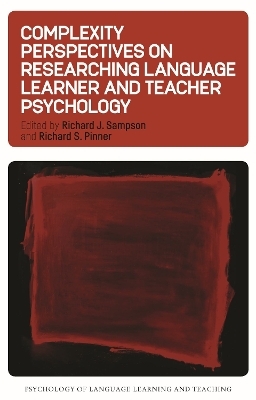
Complexity Perspectives on Researching Language Learner and Teacher Psychology
Multilingual Matters (Verlag)
978-1-78892-355-2 (ISBN)
This edited volume brings together both established and emerging researcher voices from around the world to illustrate how complexity perspectives might contribute to new ways of researching and understanding the psychology of language learners and teachers in situated educational contexts. Chapter authors discuss their own perspectives on researching within a complexity paradigm, exemplified by concrete and original examples from their research histories. Moreover, chapters explore research approaches to a variety of learner and teacher psychological foci of interest in SLA. Examples include: anxiety, classroom group dynamics and group-level motivation, cognition and metacognition, emotions and emotion regulation strategies, learner reticence and silence, motivation, self-concept and willingness to communicate.
Richard J. Sampson is an Associate Professor at Rikkyo University, Japan. He uses action research approaches to give voice to the complex, situated experience of language learner psychology and is the author of Complexity in Classroom Foreign Language Learning Motivation (2016, Multilingual Matters). Richard S. Pinner is an Associate Professor at Sophia University, Japan. His research focuses on the dynamic relationship between authenticity and motivation in language teaching and learning and his publications include Reconceptualising Authenticity for English as a Global Language (2016, Multilingual Matters).
Chapter 1. Richard S Pinner & Richard J Sampson: Introduction: [Simple and Complex?]
Chapter 2. Peter Macintyre, Sarah Mercer and Tammy Gregersen: Reflections on Researching Dynamics in Language Learning Psychology
Chapter 3. Richard J Sampson: Interacting Levels and Timescales in the Emergence of Feelings in the L2 Classroom
Chapter 4. Christina Gkonou and Rebecca Oxford: Working with the Complexity of Language Learners’ Emotions and Emotion Regulation Strategies
Chapter 5. Tomoko Yashima: Nested Systems and their Interactions: Dynamic WTC in the Classroom
Chapter 6. Lesley Smith and Jim King: Researching the Complexity of Silence in Second Language Classrooms
Chapter 7. Joseph Falout: Researching Motivational Resonance Hands-On: Learner Self-Concepts, Learning Groups and Educational Cultures
Chapter 8. Sal Consoli: Understanding Motivation Through Ecological Research: the Case of Exploratory Practice
Chapter 9. Kedi Simpson and Heath Rose: Complexity as a Valid Approach in ‘Messy’ Classroom Contexts: Promoting More ‘Ecologically Rich’ Research on the Psychology of L2 Listening
Chapter 10. Takumi Aoyama and Takenori Yamamoto: Equifinality Approach to Exploring the Learning Trajectories of Language Learners and Teachers
Chapter 11. Ryo Nitta and Yoshiyuki Nakata: Understanding Complexity in Language Classes: A Retrodictive Approach to Researching Class Climate
Chapter 12. Christine Muir: Investigating Group DMCs and Complexity in the L2 Classroom
Chapter 13. Richard Pinner: The Complexity Lens: Autoethnography and Practitioner Research to Examine Group Dynamics
Chapter 14. Alastair Henry: A Collection of Contradictory Selves: The Dialogical Self and the Dynamics of Teacher Identity Transformation
Chapter 15. Anne Feryok: Using Microgenetic and Frame Analysis in Language Teacher Cognition Research
Chapter 16. Ema Ushioda: Doing Complexity Research in the Language Classroom: A Commentary
| Erscheinungsdatum | 10.05.2021 |
|---|---|
| Reihe/Serie | Psychology of Language Learning and Teaching |
| Sprache | englisch |
| Maße | 156 x 234 mm |
| Gewicht | 660 g |
| Themenwelt | Geisteswissenschaften ► Psychologie ► Psychoanalyse / Tiefenpsychologie |
| Geisteswissenschaften ► Sprach- / Literaturwissenschaft ► Sprachwissenschaft | |
| ISBN-10 | 1-78892-355-3 / 1788923553 |
| ISBN-13 | 978-1-78892-355-2 / 9781788923552 |
| Zustand | Neuware |
| Haben Sie eine Frage zum Produkt? |
aus dem Bereich


